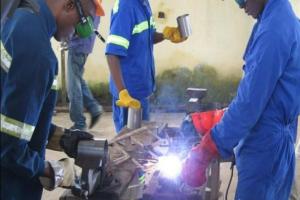
Continuous training and professional supervision constitute an initial pillar in the process of development of industrial field and of the diversification of economic resources.
This crucial pillar is the only means that could guarantee a continuous improvement for the industrial field and economic competitiveness in general; for it effectively allows the development of human resources.
The vocational training must be integrated into all phases of school and university system, to prepare the new generations to adapt easily to the labor market conditions.
This training system requires the availability of the necessary means, as well as qualified institutions, adapted curricula, experienced trainers and a favorable environment for the practical exercise of these professional trades.
The situation in Mauritania
The academic environment in Mauritania has recently seen the creation of a few vocational training institutions, in the University of Nouakchott and in the École supérieure polytechnique.
The new institutions offer academic training in several industrial fields; such as mining, energy, fishing, agriculture and agri-food.
These institutions work in close collaboration with industrial companies and public administrations, in order to adapt their pupils to labor market conditions.
Improving this new strategy which brings the world of school and business closer together could provide an effective solution to the major problems in the industrial sector in Mauritania.
The industrial market
The industrial sector in Mauritania consists mainly of the extractive industries, agro-food, chemicals and plastics, mechanics and metallurgy, materials and construction, and the treatment and transformation of maritime products.
Companies operating in this sector, which is not very diversified, still complain about the lack of a competent workforce with the skills they are looking for, notwithstanding the high number of young people graduated from university every year.
Despite its long experiences in the fields of extractive and energy industries, Mauritania has just created its first training institution in these fields.
New perspectives
The new economic changes in the Mauritanian market constitute a favorable opportunity to launch an inclusive training strategy in all industrial trades.
This strategy must take into account the concerns of private actors and put in place continuing training resources in collaboration with foreign industrial giants operating in these fields.
The implementation of this strategy will allow the private sector to improve its activities thanks to the availability of skilled labor, by reducing the costs due to the importation of foreign experts.
This situation has also prompted the State to impose a gradual Mauritanization of jobs, which obliges foreign companies to offer more opportunities to Mauritanians




